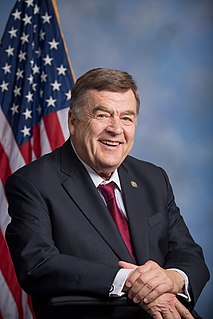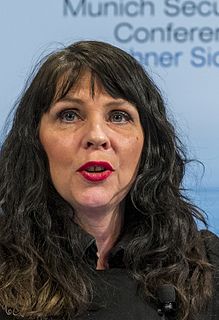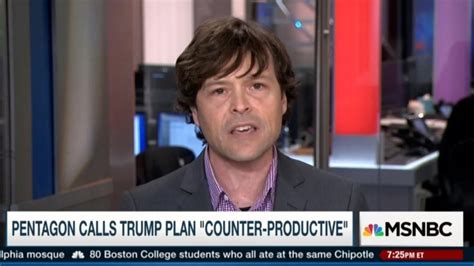Top 333 Cyber Quotes & Sayings - Page 6
Explore popular Cyber quotes.
Last updated on April 19, 2025.
New investments in cyber security and the modernization of our military will spur substantial new job creation in the private sector and help create the jobs and technologies of tomorrow. It's what we have to do. America must be the world's dominant technological powerhouse of the twenty-first century, and young Americans - including in our inner cities - should get these new jobs!
I know Donald's [Trump] very praiseworthy of Vladimir Putin, but Putin is playing a really tough, long game here. And one of the things he's done is to let loose cyber attackers to hack into government files, to hack into personal files, hack into the Democratic National Committee. And we recently have learned that, you know, that this is one of their preferred methods of trying to wreak havoc and collect information.
The FBI found Hillary Clinton to be extremely careless with classified information on her non-secured private e-mail server. While secretary of state. In addition to all we've been talking about, we're learning that Clinton actually lectured her own staff about the importance of cyber security back in 2010, telling them to do one thing while she herself was doing another thing.
The thing on cyber-security. Yes, it was - every government employee goes through this training. You do hear at corporations, as well. In addition, everybody that works at the State Department that has a clearance has to sign a document that says that they got a briefing on how to handle classified info. Hillary Clinton is the secretary of state. She makes a terrible, reckless decision, and it almost ruined her candidacy.
I'd turn off the internet for a month and make us actually talk to each other, and be responsible for your opinions and not be able to hide behind the anonymity of the cyber-wall to speak your mind. To actually have to face people and see their reactions and discuss it - actually discuss it. It won't happen. Unless the grid goes down.
Pittsburgh has long sent more than our fair share of young people to defend this country, and our universities are already building the cyber-security workforce of the future. But the training can start earlier, and there is no better group of young people to help us get there than the students who choose JROTC.
What we need to do is we need to create new international standards of behavior - not just national laws, because this is a global problem. We can't just fix it in the United States, because there are other countries that don't follow U.S. laws. We have to create international standards that say that cyber attacks should only ever occur when it is absolutely necessary.
In the early days of the Internet, the word "navigation" had this ingrained in it. There really was a sensation of the cyber-flâneur, as you really would have no idea where you would end up. You would end up on pages that had nothing to do with what you wanted, experiences that were totally unanticipated. You had to connect the dots, connect the parcels of your experience. It was totally open to randomness.
There is no contradiction between technology and spirit. There is no contradiction between the search for intellectual integration and understanding and the psychedelic experience. There is no contradiction between ultra-advanced hyperspacial cyber culture and Paleolithic archaic culture. We have come to the end of our sojourn in matter. We have come to the end of our separateness.
In 2010, you have roughly 38 billion dollars spent by government on cyber and telecoms security and another 60 billion or so by private corporations. So approximately 100 billion dollars spent on security, mostly on technological solutions, which the corporates are offering governments in particular; it's a very high growth area. So everyone is climbing over each other to get the contracts for government procurement on this. There is undoubtedly an element of this and that's what encourages, in part, the whole idea of locking down the Internet.
These new investments in cyber security and the modernization of our military will spur substantial new job creation in the private sector and help create the jobs and technologies of tomorrow. It's what we have to do. America must be the world's dominant technological powerhouse of the twenty-first century, and young Americans - including in our inner cities - should get these new jobs!
The anonymity issue is a big question. As long as people can disguise cyber attacks and as long as there is a sort of question mark over who is responsible, then the problem will continue to exist. And of course what happens in response to that is that there is a move to try and refashion the Internet so that anonymity is impossible, which of course leads to fears among all sorts of groups - civil rights groups, NGOs, and political parties - that the Internet is going to be used simply as a method of control. So these are very sensitive issues.
I don't think I underestimated [Vladimir Putin], but I think that I underestimated the degree to which, in this new information age, it is possible for misinformation for cyber hacking and so forth to have an impact on our open societies, our open systems, to insinuate themselves into our democratic practices in ways that I think are accelerating.
The Pirate Party started in Sweden in 2006, and it only had one agenda: to change draconian copyright laws. But it's changed and shifted primarily because the questions of human rights and cyber have become much more relevant. So if you want to place it somewhere on the spectrum, I would say it's a party that has its roots in civilian rights. But we are not like many left parties that want to regulate citizens and create nanny states. We believe that regulation should be on the powerful, not the individuals.
I have done business in China for 25 years, so I know that in order to get China to cooperate with us, we must first actually retaliate against their cyber-attacks so they know we're serious. We have to push back on their desire to control the trade route through the South China Sea through which flows $5 trillion worth of goods and services every year.
It's always been government's role to protect the security of the nation. And cyber-attacks is a security issue, from our perspective. And it's a security issue of particular concern with respect to the nation's core critical infrastructure, the infrastructure everyone relies on, the energy sector, the telecommunications sector, the banking sector.
There are governments who are regulating things in different ways and those forms of regulation often don't square up. So you have a real legislative mess, in the meanwhile various bad people are developing all sorts of tools to exploit the Internet for their own gain and the militaries are beginning to develop some extremely frightening offensive capabilities in cyber. Yet all of this is taking place outside of any international agreement or even framework.
What we're going to do with cyber-attacks - and we have already actually started - we started well before the executive order actually was issued - is working with the private sector, determine how best to share information, because, you know, we can't help until we know that there has actually been an attempted intrusion or attack. Information-sharing piece is very important.
When people conceptualize a cyber-attack, they do tend to think about parts of the critical infrastructure like power plants, water supplies, and similar sort of heavy infrastructure, critical infrastructure areas. And they could be hit, as long as they're network connected, as long as they have some kind of systems that interact with them that could be manipulated from internet connection.
Kids can be cruel enough as it is, but cyber bullying or you're on Instagram and see your friends are all somewhere and you're not there. Then it's like, "Why am I not there?" Girls are using apps to change the way their faces look so the look quote-unquote perfect and beautiful. I feel like kids these days, it's gotta be just a big ball of anxiety.
Look, it's no longer about capacity, how many ships, how many air wings, how many battalions. It's about capability. If we dominate cyber space and know and can read the other guy's mail, and with a very accurate laser-guided munitions put it in this window or that window, it's not how much, it's knowing exactly where to pinpoint a target.
I think that all of the cyber attacks that are taking place, but particularly this - the Russian one, had a profound impact on the American system, on our political process, on our - it invaded the space of our election. The releasing on a regular basis of one party's stolen emails had an impact, and I think that other things also had an impact.
The government can now delve into personal and private records of individuals even if they cannot be directly connected to a terrorist or foreign government. Bank records, e-mails, library records, even the track of discount cards at grocery stores can be obtained on individuals without establishing any connection to a terrorist before a judge. According to the Los Angeles Times, Al Qaeda uses sophisticated encryption devices freely available on the Internet that cannot be cracked. So the terrorists are safe from cyber-snooping, but we're not.
Custom developed digital weapons, cyber weapons nowadays typically chain together a number of zero-day exploits that are targeted against the specific site, the specific target that they want to hit. But it depends, this level of sophistication, on the budget and the quality of the actor who's instigating the attack. If it's a country that's less poor or less sophisticated, it'll be a less sophisticated attack.
FinCEN directs financial institutions to file suspicious activity reports (SARs) to inform law enforcement of certain types of cyber-enabled crime. As the agency charged with protecting the United States from financial crime, FinCEN's guidance does not deem financial institutions who process such transactions to be involved in a criminal activity.
The thing that has disturbed me most about the Russian hacking episode is - and the thing that surprised me most has not been the fact of Russian hacking. The cyber world is full of information gathering, you know, propaganda, et cetera. I have been concerned about the degree to which, in some circles, you've seen people suggest that Vladimir Putin has more credibility than the U.S. government. I think that's something new.
The bare bones tools for a cyber-attack are to identify a vulnerability in the system you want to gain access to or you want to subvert or you want to deny, destroy, or degrade, and then to exploit it, which means to send codes, deliver code to that system somehow and get that code to that vulnerability, to that crack in their wall, jam it in there, and then have it execute.
We do know from our intelligence community that Russia had a design to discredit the U.S. elections, and took sides in favor of Mr. Donald Trump over Hillary Clinton. We do now that they engaged individuals and entities to do cyber-attacks to get as much information as they possibly could, and of course, also used WikiLeaks to accumulate information, and released it in a strategic way that could affect our election, and certainly the credibility of our election.
Today, 90% of terrorist activity on the Internet takes place using social networking tools, be it independent bulletin boards. The most important terrorist communiques and videos are virtually all initially released on certain password-protected chat forums run by Al-Qaida supporters. These forums act as a virtual firewall to help safeguard the identities of those who participate, and they offer subscribers a chance to make direct contact with terrorist representatives, to ask questions, and even to contribute and help out the cyber jihad.























